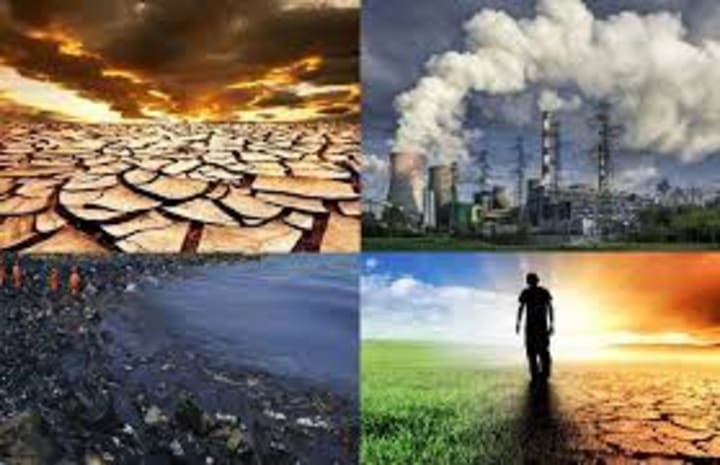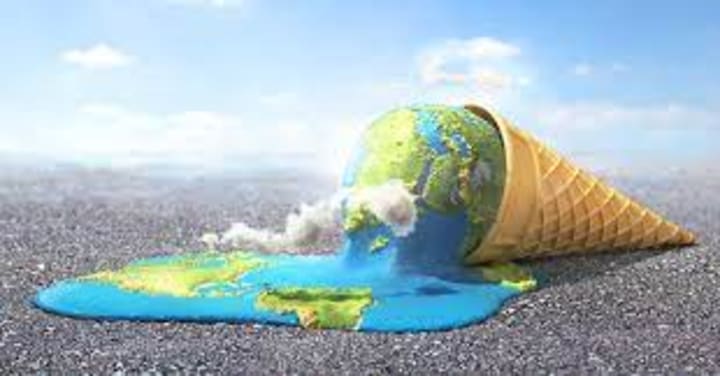
Global warming refers to the long-term trend of rising average global temperatures primarily due to the increased concentration of greenhouse gases (GHGs) in the Earth's atmosphere, particularly carbon dioxide (CO2) from burning fossil fuels, deforestation, and other human activities. This warming is causing significant changes to our planet, including rising sea levels, melting glaciers and ice caps, more frequent and severe weather events such as hurricanes, droughts, floods, and heatwaves, as well as negative impacts on biodiversity, agriculture, and human health.
https://www.amazon.com/deal/d724ff42?_encoding=UTF8&linkCode=r02&tag=varol73-20&linkId=77a6e5dcde48fcca8259e6f429f56dc8&ref_=ihub_rc_td_c_deals-promotions_d724ff42

The Intergovernmental Panel on Climate Change (IPCC) - a global scientific body established by the United Nations - has concluded that it is extremely likely (95-100% probability) that human activities have been the dominant cause of observed warming since the mid-20th century. The concentration of atmospheric CO2 has increased from around 280 parts per million (ppm) in the pre-industrial era to over 410 ppm in 2021 - the highest level in at least 800,000 years.
To address global warming, countries around the world have adopted various policies and strategies to reduce GHG emissions, including the Paris Agreement, which aims to limit global warming to well below 2°C above pre-industrial levels and pursue efforts to limit the increase to 1.5°C. This requires a rapid and comprehensive transition to low-carbon energy systems, increased energy efficiency, sustainable land use practices, and other measures to reduce emissions across all sectors of the economy.Global warming is the gradual increase in the Earth's average surface temperature due to human activities, such as the burning of fossil fuels, deforestation, and agriculture. This increase in temperature is caused by the release of greenhouse gases, such as carbon dioxide, methane, and nitrous oxide, into the atmosphere.

The consequences of global warming include rising sea levels, more frequent and severe heatwaves, droughts, wildfires, and storms, loss of biodiversity, and negative impacts on human health, agriculture, and economies.
https://www.amazon.com/deal/d724ff42?_encoding=UTF8&linkCode=r02&tag=varol73-20&linkId=77a6e5dcde48fcca8259e6f429f56dc8&ref_=ihub_rc_td_c_deals-promotions_d724ff42
According to the Intergovernmental Panel on Climate Change (IPCC), the Earth's surface temperature has increased by 1.1°C since the pre-industrial era, and it is projected to reach 1.5°C above pre-industrial levels between 2030 and 2052 if current trends continue. The IPCC has also called for urgent and ambitious action to limit global warming to 1.5°C and prevent the worst impacts of climate change.
To address global warming, countries have signed the Paris Agreement, which aims to keep the global temperature increase well below 2°C and pursue efforts to limit it to 1.5°C. The agreement requires countries to submit their nationally determined contributions (NDCs), which outline their goals and plans to reduce greenhouse gas emissions and adapt to the impacts of climate change.
Global warming refers to the long-term increase in the Earth's average surface temperature caused by human activities, such as the burning of fossil fuels, deforestation, and industrial processes, which release greenhouse gases (mainly carbon dioxide, methane, and nitrous oxide) into the atmosphere.
These gases trap heat from the sun, leading to an increase in the Earth's surface temperature, which can cause a range of environmental and societal impacts, such as more frequent and severe heatwaves, droughts, floods, storms, rising sea levels, ocean acidification, and biodiversity loss.
The scientific consensus is that global warming is happening and that it is largely caused by human activities. The Intergovernmental Panel on Climate Change (IPCC) has warned that without urgent and drastic action to reduce greenhouse gas emissions, global warming could have catastrophic consequences for the planet and its inhabitants.
To combat global warming, efforts are being made to reduce greenhouse gas emissions through measures such as renewable energy, energy efficiency, and carbon capture and storage. There is also a growing movement for individuals and organizations to adopt more sustainable practices in their daily lives and operations.
About the Creator
recep
Everything about life






Comments
There are no comments for this story
Be the first to respond and start the conversation.